Unit 4 Pygmalion Period 2 Learning about Language & sing Language 同步精练(人教版选修8,重庆专用)
人教版高中英语选修8Unit4《Pygmalion》word教案
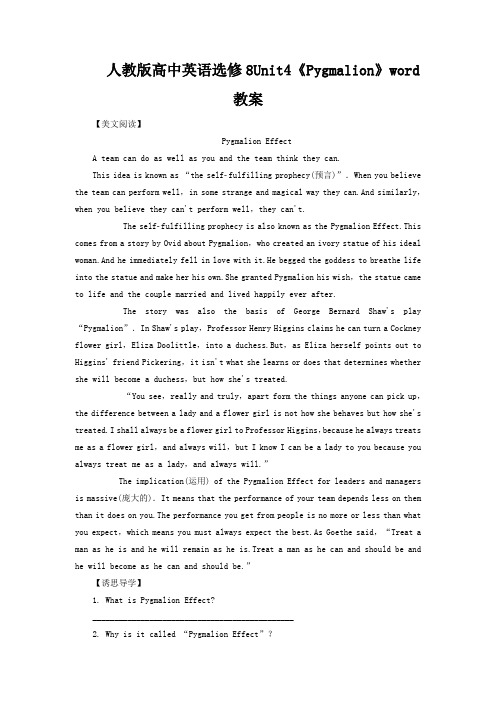
人教版高中英语选修8Unit4《Pygmalion》word教案【美文阅读】Pygmalion EffectA team can do as well as you and the team think they can.This idea is known as “the selffulfilling prophecy(预言)”.When you believe the team can perform well,in some strange and magical way they can.And similarly,when you believe they can't perform well,they can't.The selffulfilling prophecy is also known as the Pygmalion Effect.This comes from a story by Ovid about Pygmalion,who created an ivory statue of his ideal woman.And he immediately fell in love with it.He begged the goddess to breathe life into the statue and make her his own.She granted Pygmalion his wish,the statue came to life and the couple married and lived happily ever after.The story was also the basis of George Bernard Shaw's play “Pygmalion”.In Shaw's play,Professor Henry Higgins claims he can turn a Cockney flower girl,Eliza Doolittle,into a duchess.But,as Eliza herself points out to Higgins' friend Pickering,it isn't what she learns or does that determines whether she will become a duchess,but how she's treated.“You see,really and truly,apart form the things anyone can pick up,the difference between a lady and a flower girl is not how she behaves but how she's treated.I shall always be a flower girl to Professor Higgins,because he always treats me as a flower girl,and always will,but I know I can be a lady to you because you always treat me as a lady,and always will.”The implication(运用) of the Pygmalion Effect for leaders and managers is massive(庞大的).It means that the performance of your team depends less on them than it does on you.The performance you get from people is no more or less than what you expect,which means you must always expect the best.As Goethe said,“Treat a man as he is and he will remain as he is.Treat a man as he can and should be and he will become as he can and should be.”【诱思导学】1. What is Pygmalion Effect?______________________________________________2. Why is it called “Pygmalion Effect”?______________________________________________【答案】 1.It means that when you believe the team can perform well,in some strange and magical way they can.And similarly,when you believe they can't perform well,they can't.2.It is based on the George Bernard Shaw's play “Pygmalion”.Period ⅠPreviewing(教师用书独具)●教学目标本课时要紧是通过学生对学案所给出的内容的学习,了解本课文中所显现的词汇,初步了解课文以及相关的背景知识,为下一堂课对课文的全面明白得起到一个铺垫作用。
一轮复习Unit4Pygmalion知识点清单

Unit 4 Pygmalion(一)重点词汇——分类记忆Ⅰ.阅读词汇——知其意1.plot n.情节;阴谋2.handkerchief n. 手帕;手绢;纸巾3.ambassador n. 大使;使节4.cookie n. 饼干5.nail n. 指甲;钉子6.superior adj. 优秀的;较高的;上级的n. 上级;长官7.sob vi. 啜泣;抽噎n. 啜泣(声);抽噎(声)8.status n. 身份;地位;职位9.waist n. 腰;腰部;腰围10.fateful adj. 重要的;决定性的;命中注定的11.referee n. 裁判员;仲裁者12.disapprove v. 不赞成;反对;认为不好13.brilliant adj. 光辉灿烂的;杰出的;才华横溢的14.extraordinary adj. 不同寻常的;非凡的15.whistle vi. 吹口哨;发出汽笛声n. 口哨声;汽笛声16.outcome n. 结果;效果Ⅱ.核心词汇——写其形1.betray vt.显露出(本来面目);背叛2.remark n. 谈论;言论;评述vt.& vi. 谈论;评论;说起3.properly adv. 适当地;恰当地4.handful n. 一把;少量5.overlook vt. 俯视;忽视;不理会6.compromise n.& vi. 妥协;折衷7.condemn vt. 谴责;使……处于不幸(不愉快)的状态8.classify vt. 把……分类;把……归类9.shabby adj. 破旧的;寒酸的10.wallet n. 皮夹;钱包11.troublesome adj. 带来麻烦的;使人心烦的12.fade vi.& vt. (使)褪色;减弱;逐渐消失13.acquaintance n. 相识;了解;熟人Ⅲ.拓展词汇——通其变1.adapt v. (使)适应;改编→adaptation n.适应(性)2.classic adj.经典的n.经典著作→classical adj.古典的;经典的3.professor n.教授→profession n.职业;专业→professional adj.专业的n.专业人员4.disgust vt.使反感→disgusting adj.使人反感的;令人厌恶的→disgusted adj.反感的5.hesitate vi.犹豫;踌躇→hesitation n.犹豫;踌躇6.comfort n.舒服→comfortable adj.舒适的;舒服的→comfortably adv.舒服地;舒适地→uncomfortable adj.不舒服的→uncomfortably adv.不舒服地;不自在地7.mistake n.错误;失误v.误会→mistaken adj. 错误的;不正确的8.amaze vt.使吃惊→amazed adj.吃惊的→amazing adj.令人吃惊的→amazement n.惊讶;惊愕9.fortune n.机会;运气;大笔的钱→fortunate adj.幸运的→fortunately adv.幸运地10.effect n.效果;影响→effective__adj.有效的11.rob vt.抢劫;盗窃;剥夺→robbery n.抢劫(行为)→robber n.强盗;盗贼12.music n.音乐→musical adj.音乐的;喜爱音乐的n.音乐喜剧→musician n音乐家补充词汇1.-some形容词后缀①troublesome带来麻烦的;使人心烦的②awesome 令人敬畏的③tiresome 使人厌倦的④bothersome 引起麻烦的⑤brightsome 明亮的;灿烂的⑥handsome 英俊的2.含mis-前缀的动词集锦①mistake 误会②misunderstand 误解③misuse 误用;滥用④mislead 误导⑤misprint 印错⑥mistrust 不信任3.condemn及其相关动词荟萃①condemn谴责;使……处于不幸(不愉快)的状态②accuse/charge 起诉③scold 责骂④criticize 批评⑤punish 惩罚(二)重点短语——记牢用活1.in__disguise伪装(的);假扮(的)2.pass...off__as... (把某人)改变或冒充成……3.make__one’s__acquaintance/make__the__acquaintance__of__结识;与……相见4.generally__speaking__ 一般来说5.in__terms__of... 就……来说;从……角度6.rob__sb.__of__sth.__ 抢劫某人某物7.show...in/out 带或领……进来/出去8.once__more__ 再一次9.fade__out (声音、画面)逐渐模糊;渐淡10.in__need__of__ 需要……11.in__amazement__ 震惊;惊讶12.deal__with 处理;应付补充短语1.“in+n.”构成的短语集锦①in disguise 伪装(的);假扮(的)②in nature 本质上③in stock 现有;备有④in force 有效;实施中⑤in shape 处于良好状态⑥in amazement 震惊;惊讶2.“adv.+speaking”短语聚焦①generally speaking一般来说②honestly speaking 诚实地说③frankly speaking 坦率地说④exactly speaking 确切地说⑤strictly speaking 严格地说⑥personally speaking 就个人而言3.表示“处理;对付”的短语一览①do with处理;对付②deal with 处理;对付③cope with 处理;应付④treat with 处理;应付⑤handle with 处理⑥dispose of 处理;解决(三)重点句式——背熟巧用。
高中英语优秀教案Unit4Pygmalion(新人教版选修8)
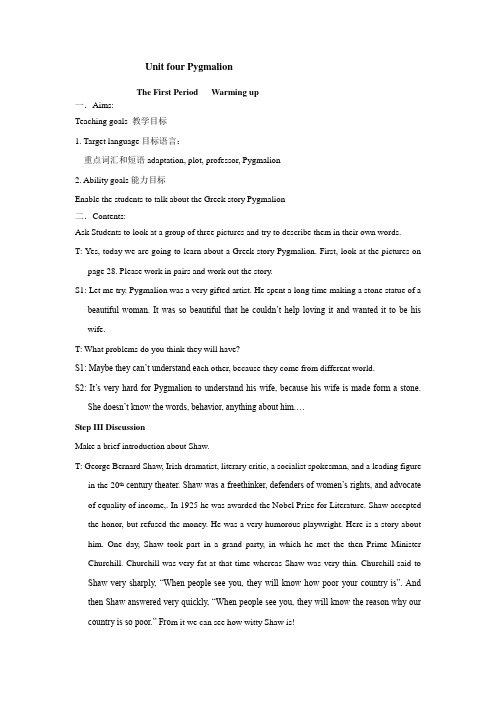
Unit four PygmalionThe First Period Warming up一.Aims:Teaching goals 教学目标1. Target language目标语言:重点词汇和短语adaptation, plot, professor, Pygmalion2. Ability goals能力目标Enable the students to talk about the Greek story Pygmalion二.Contents:Ask Students to look at a group of three pictures and try to describe them in their own words.T: Yes, today we are going to learn about a Greek story Pygmalion. First, look at the pictures on page 28. Please work in pairs and work out the story.S1: Let me try. Pygmalion was a very gifted artist. He spent a long time making a stone statue of a beautiful woman. It was so beautiful that he couldn’t help loving it and wanted it to be his wife.T: What problems do you think they will have?S1: Maybe they can’t understand ea ch other, because they come from different world.S2: It’s very hard for Pygmalion to understand his wife, because his wife is made form a stone.She doesn’t know the words, behavior, anything about him.…Step III DiscussionMake a brief introduction about Shaw.T: George Bernard Shaw, Irish dramatist, literary critic, a socialist spokesman, and a leading figure in the 20th century theater. Shaw was a freethinker, defenders of women’s rights, and advocate of equality of income,. In 1925 he was awarded the Nobel Prize for Literature. Shaw accepted the honor, but refused the money. He was a very humorous playwright. Here is a story about him. One day, Shaw took part in a grand party, in which he met the then Prime Minister Churchill. Churchill was very fat at that time whereas Shaw was very thin. Churchill said to Shaw very sharply, “When people see you, they will know how poor your country is”. And then Shaw answered very quickly, “When people see you, they will know the reason why our country is so poor.” Fro m it we can see how witty Shaw is!T: Have you seen the film My Fair Lady? Do you like the film?Say something about the film.Step V HomeworkAsk the students to do the following.1. Find more information about Pygmalion2.Pre-read the play and get ready for the next period.The Second Period Reading一.Aims:1. Ability goals能力目标Enable the Ss to talk bout the play and use the play to work out the characteristics of each social group.2. Learning ability goals 学能目标Help the Ss learn how to talk about the play and use the play to work out the characteristics of each social group.二.Contents:Step I Revision and Lead-inStep II ReadingDeal with the Reading part. Play the tape for the Ss to listen. Then analyze the play.Ask the students to read through the text. While reading, pay attention to the writingstyle.SkimmingAsk the Ss to read the play quickly and answer the questions.T: Now please read the play. After a few minutes, I’ll ask you some questions.Show the followings.1.How many characters are there in the play?2.What is the weather like when the play begins?3.Do you think Eliza a well educated woman, why or why not?4.Why did Professor Higgins want to make notes of what Eliza said?5.What’ the meaning of the newly rich?ScanningAsk three students to read to the play while other students scan it and get ready to answer the questions:According to Higgins, if a person is very poor, he or she can still be better off at last. Do you agree with him? If so, how to realize the aimWho can complete the last sentence in the first line on page 30: Now once taught by me…?What other things show one’s statue in society apart from how one speaks?Do you think Pickering if of the upper class?Step III ComprehendingAsk Ss to listen to the tape as carefully as possible. They should not only pay attention to the pronunciation and intonation but get the main idea of the play as well.T: Pygmalion is about recognizing a person’s position in society by the way they behave and speak. Please listen to the tape and use the play to work out the characteristics of each social group.And then fill in the blanks on page 30Step IV DiscussionAsk Ss to do part 5 on page 31.T: Suppose you have a chance to help Eliza improve her use of the English language. Look at the sentences on page31 in Part 5 and help her correct all these sentences in terms of grammar, spelling, etc, so that she can use them properly.Step V Homework1.Read the play repeatedly and try to act out it.2.Preview the grammar part.The Third Period Language Points一.Aims:Learn the language points and some important sentence patterns.二.Contents:1. work out 计算出,设法弄懂,精心制定出,逐渐解决,按某种方式发展。
unit4pygmalion教案
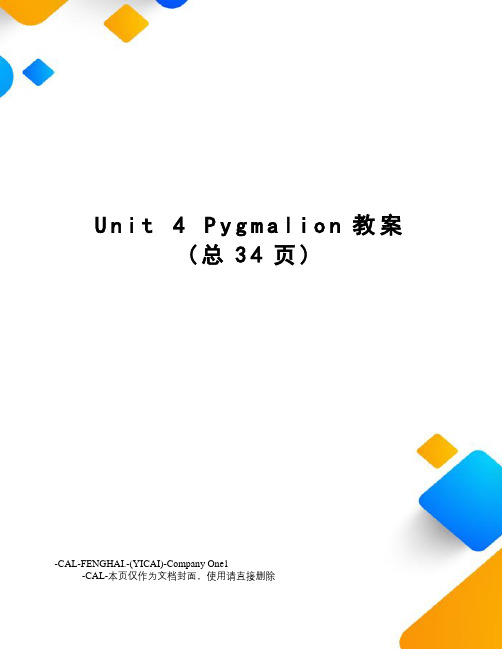
U n i t4P y g m a l i o n教案(总34页)-CAL-FENGHAI.-(YICAI)-Company One1-CAL-本页仅作为文档封面,使用请直接删除Unit 4 Pygmalion Ⅰ. 单元教学目标Ⅱ. 目标语言Ⅲ. 教材分析和教材重组1. 教材分析本单元以皮格马利翁为话题,通过学习,使学生了解具有共同主题的希腊神话Pygmalion与萧伯纳戏剧之间在表现形式、人物塑造等方面的相同与不同之处;并能在此基础上,讨论和表演部分戏剧场景;能为该剧本写出一份评论;能模仿剧本编写一个戏剧场景,即Higgins教授如何给Eliza上第二课的场景。
语法部分重点学习过去分词作状语的用法。
1.1Warming Up 是三幅描述希腊神话故事Pygmalion主要情节的图画。
要求学生根据图片提示,联系已有知识,再现这个美丽的神话故事,并能就此话题展开讨论。
1.2 Pre-reading中所列三个问题,意在让学生提炼萧伯纳戏剧与希腊神话故事所反映的共同主题,并初步酝酿可能出现的故事情节。
1.3 Reading讲述了发生在伦敦剧院外的一幕。
主要人物有Eliza, Higgins,Pickering。
Eliza原是伦敦市的一名卖花女,在一次偶然的情况下遇见了以能听懂别人口音而自傲的Professor Higgins。
Professor Higgins与Colonel Pickering打赌,说他能将口音其糟无比,讲话粗鲁的Eliza改造成能讲标准英文的淑女。
Eliza就住在Professor Higgins的家中,受了一阵子语言训练。
最后两人认为已经训练有成,便带Eliza到一个盛大的宫廷舞会。
在场的人都不知道Eliza的出身。
女王还对Eliza大加赞赏。
Professor Higgins自傲于自己的成功,完全忽略了Eliza的感受。
Eliza 盛怒之下,离开了Higgins。
她走之后,Higgins才发现不能没有她。
高中英语选修八教案:unit4 pygmalion

单元要点预览(旨在让同学整体了解本单元要点)词汇部分词语辨析1. adapt / adopt2. ignore / neglect / overlook3. luck / fortune / destiny / fate词形变化1. comfort n. 舒适;安慰vt.使舒适;安慰,慰问comfortable adj.舒服的uncomfortable adj.不舒服的,不自在的comfortably adv.舒适地uncomfortably adv.不舒服地;难受地2. classify vt. 把……分类,把……分级classification n.分类,分级;类别,级别3. betray vt. 出卖;背叛betrayal n.出卖,辜负,暴露betrayer n. 出卖者4. superior adj.上级的,较高的n.上级,长官superiority n.优越(性) ,优等5. trouble n. 麻烦,困难vt.麻烦vi.费力troublesome adj. 令人烦恼的,麻烦的6. pronounce vt.发音;宣布pronunciation n.发音重点单词1. adaptation n. 改编2. hesitate vi. 犹豫,踌躇,不愿3. mistaken adj. 犯错的,错误的4. condemn vt. 判刑,谴责,宣告……不适用5. acquaintance n.相识;熟悉n.熟人6. fortune n.命运;运气;机会财产,财富重点词组1. pass sb. off as... 把某人改变或冒充成……2. a handful of 一把;一小撮,少数,少量3. in amazement 惊讶地4. in terms of... 以……的观点;就……而说5. show... in 带或领……进来重点句型1. Generally speaking, people are more polite to those whom they think are of higher social class.2. Henry Higgins and Colonel Pickering are sitting deep in conversation.重点语法分词作状语(见语法部分)1. adapt / adopt【解释】adapt v. 使…适应,改编This novel has been adapted for radio from the Russian original. 这部小说已由俄文原著改编成无线电广播节目。
Unit 4《Pygmalion 》Learning about language 导学案-人教选修8精品
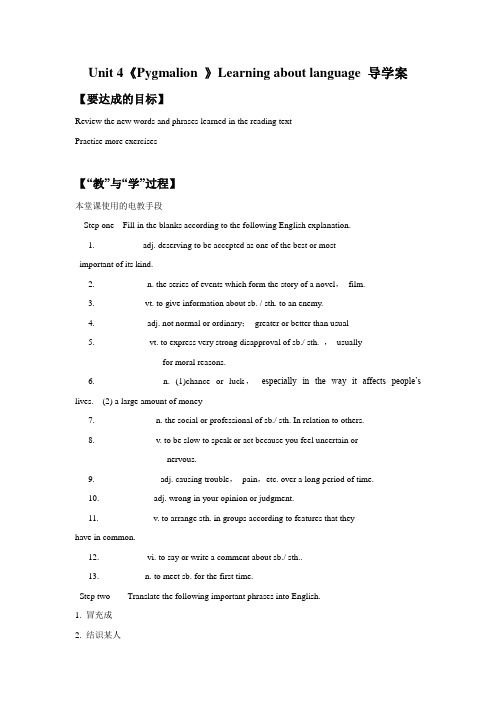
Unit 4《Pygmalion 》Learning about language 导学案【要达成的目标】Review the new words and phrases learned in the reading textPractise more exercises【“教”与“学”过程】本堂课使用的电教手段Step one Fill in the blanks according to the following English explanation.1. __________ adj. deserving to be accepted as one of the best or mostimportant of its kind.2. ___________ n. the series of events which form the story of a novel,film.3.___________ vt. to give information about sb. / sth. to an enemy.4. ___________ adj. not normal or ordinary;greater or better than usual5.____________ vt. to express very strong disapproval of sb./ sth. ,usuallyfor moral reasons.6. _____________ n. (1)chance or luck,especially in the way it affects people’s lives. (2) a large amount of money7. _____________ n. the social or professional of sb./ sth. In relation to others.8. _____________ v. to be slow to speak or act because you feel uncertain ornervous.9. ______________ adj. causing trouble,pain,etc. over a long period of time.10. ____________adj. wrong in your opinion or judgment.11. ____________v. to arrange sth. in groups according to features that theyhave in common.12. __________ vi. to say or write a comment about sb./ sth..13.__________ n. to meet sb. for the first time.Step two Translate the following important phrases into English.1. 冒充成_____________2. 结识某人_____________3. 一般来说_____________4.就……而言_____________5. 碰运气___________6. 一把;少量__________Step three 词语串串练Last night,I watched a play,an 1(改编本)_______ of a 2(经典)________ novel by Bernard Shaw. The play’s 3(情节)_____ is very simple,but4(就。
高中英语 选修8 语言点讲解Unit 4 Pygmalion

单句改错
③It's bad manners to remark their shortcomings in the absence
of other people.
remark 后加 on/upon
返回
3.acquaintance n.相识;了解;熟人 [教材原句] And I came to England to make your acquaintance! 我也正是到英国来找你的!
→__d_is_g_u_s_t_e_d_ adj.反感的 18.effective adj.有效的→ effect n.效果;影响
[语境活用]
返回
1.In the lecture, the professor said that his profession is to cultivate more professionals for the country. (profession)
高中英语Unit 4 PygmalionPeriod2[ty]八
![高中英语Unit 4 PygmalionPeriod2[ty]八](https://img.taocdn.com/s3/m/b473112359fb770bf78a6529647d27284b733715.png)
号顿市安谧阳光实验学校Unit 4 PygmalionPeriod 2 A sample lesson plan for Learning about Language(Revise the Past Participle as the Adverbial)IntroductionIn this period students will be first helped by the teacher to discover and learn to use some useful words and collocations, and then to discover and revise the past participle as the adverbial. The following steps of teaching may be taken: Warming up by looking for the Past Participle as the Adverbial,Learning about the past participles used as the adverbials, Correcting and completing, Closing down by putting on a short play.ObjectivesTo help students revise the Past Participle as the AdverbialTo help students discover and learn to use some useful words and collocationsTo help students discover and learn to use some useful structures Procedures1. Warming up by looking for the Past Participle as the Adverbial Hi, class. Let’s go over the play Fateful Meetings to look for examples of the Past Participle as the Adverbial.2. Learning about the past participles used as the adverbialsThe past participles are sometimes used as the adverbials. Look at the following examples:*We went home exhausted (疲惫地). (逻辑主语we, 过去分词exhausted)*Encouraged by my teacher, I decided to work hard. (逻辑主语 I,过去分词encouraged)*Granted that he has enough money to buy the house, it doesn't mean he's going to do so.*Told by the teacher, she knew she was wrong. (分词 told 用过去式分词表示被动)*Now you are going to read the text for more examples of the past participles used as the adverbials.3. Correcting and completingNow you shall go on to do exercises 2 and 3 on page 33.First you are to read the 5 sentences and correct any mistakes in them. Check with a partner.Then read the uncompleted passage and complete it with suitable words, in the form of either the present or past participle.4. Closing down by putting on a short playTo end this period we are going to put on a short play.Hamlet and the Heckler (a very short play)Hamlet: To be or not to be...Heckler: I knew it. I knew he was going to say that.Hamlet: that is the question...Heckler: He's going to say the rest of it, too.Hamlet (to Heckler): Excuse me, do you mind?Heckler: I didn't know he was going to say THAT.Hamlet: I'm just trying do my job here.Heckler: Yeah, but do you have to do it the same way every time? Hamlet: Well, this IS Shakespeare you know.Heckler: Ooooo, Shakespeare. Why don't you do Shakespeare with modern language?Hamlet: Shakespeare wrote it perfect the way it is. We can't change it. Heckler: Why not? Just change "To be or not to be..." into whatever the hell it means. [pause] By the way, what does it mean?Hamlet:Well, he's considering suicide. He's considering which might be better, living or dying, being or not being. Changing it would sound stupid, wouldn't it? It wouldn't be memorable.Heckler: But the audience would understand it, for a change. Hamlet: But people do understand Shakespeare, at least most of it. And they figure out the rest from the context.Heckler:I'll bet the audience didn't know what "To be or not to be" means from the context.Hamlet: Then how would you say it?Heckler: How should I know? I'm just a heckler.Hamlet: Then why don't you just shut the hell up?Heckler: Not bad, was that Shakespeare?[curtain]。
高中英语新人教版精品教案《Unit4 Pygmalion 教学设计》

Unit 4 Pygmalion 教学设计一、学情分析1、设计教学对象:高二年级学生2、认知根底:高中二年级学生已经初步具有一定的认知能力,也掌握了一定的阅读技能和技巧;高中的学生根本上能用英语清晰地表达个人观点,准确地描述生活现象或表达个人情感。
3、心理特征:高中学生思想活泼,求知欲旺盛,学习态度明确,自我意识开展迅速并趋向成熟,独立自主性强,有一定的价值取向。
4、学习能力:高中生在阅读的过程中他们会选择性地使用相关的阅读策略;自主阅读与表达能力已有一定根底,也具备了一定的团体协作能力,并能进行有效成功的交流、合作、与讨论。
同时学生对戏剧、电影等外国文学作品十分感兴趣,而且,此时的心理已趋向成熟,自我意识明显增强,能提出具有创造性的观点。
二、教材分析本课是人教版新课标教材选修8 Unit4 Pygmalion〔Reading〕。
本课主要介绍了萧伯纳的戏剧?皮格马利翁?〔?窈窕淑女?〕,帮助学生进一步了解戏剧,了解西方文化和社会背景。
本节课是这篇阅读的第一节课,目的旨在让学生读懂文章的意思、了解文章的内容、把握文章的中心,从而提升自己的阅读能力。
在本节课,教师大胆地对教材进行整合,将整个戏剧的主要轮廓整合在一起,删减增加为教学任务效劳。
三、教学目标1〕语言知识目标:使学生会使用本单元的相关词汇讲述该故事情节,及表达自己对该故事的看法。
2〕语言技能目标:a)使学生学会克服生词障碍,通过略读,找出人物特征,理清人物关系;通过查读,捕捉文章的重要细节,分析人物性格,理解作者的写作意图;b)使学生学会运用各种猜词技巧,猜想局部生词在具体的语言环境的含义;c〕通过对文章的讲解,使学生理解皮格马利翁式的影响。
3〕情感态度与文化意识目标:a)通过对本文的学习,唤起学生对生活的关注,增强学生对文学作品的理解能力,激发学生对戏剧学习的热情,从而提高学生的文学素养;b)通过微课,让学生了解“皮格马利翁效应〞,在面对困难时不抛弃不放弃。
Unit4Pygmalion教学设计新部编版

精选教课教课方案设计 | Excellent teaching plan教师学科教课方案[ 20–20学年度第__学期]任教课科: _____________任教年级: _____________任教老师: _____________xx市实验学校Unit 4Pygmalion教课方案I元教课目TopicsLiterary work;drama;read and act a playII目言1.推、猜( Conjecture)功I wonder whether⋯I think it ’s because⋯能Is it possible that⋯?Perhaps/ Maybe, but⋯句Why do you think so?Do you know if ⋯?式Do you really think that ’s true? Why do you think ⋯ like that? 2. 感情( Emotions)How do you feel about ⋯?What do you think would make ⋯ happier?Mrs. Pearce would comfort/ encourage her by⋯Surprised, disappointed , worried, confused, amazed , upset,sobbing, weeping , laughing , hesitatingHopefully , uncomfortably , kindly, dismissively , gently , happily,gratefully , heartily, proudly3.判断与价(Judgment and evaluation)Perhaps you could do more⋯ I know you talked about ⋯ but ⋯ Ithink you need more practice at⋯Your ⋯ has improved, but you still need to⋯I think you look perfect, but ⋯Your use of ⋯ is much better, but⋯1.四会Adaptation , plot , professor, officer, hesitate,pence ,uncomfortable, uncomfortably, troublesome, outcome, mistaken,brilliant, classify,mile, betray, dismiss, dismissively,condemn, ambassador, acquaintance, handful, fortune, upper, status,superior, pronunciation, antique, musical, pronounce, nail,compromise, horrible, bathtub, sob, sob, disgusting, overlook,alphabet, fade, classic, effective2.pass⋯off, as⋯, make one’s acquaintance, in amazement, generallyspeaking, in terms of⋯ , show⋯ in , the other day, take away, once more,in need of⋯ , fade out复去分做状( Revise the Past Participle as the Adverbial)1.去分作状,可以表示、原由、条件、方式、陪伴等。
Unit 4 Pygmalion Section Ⅱ Learning about Language
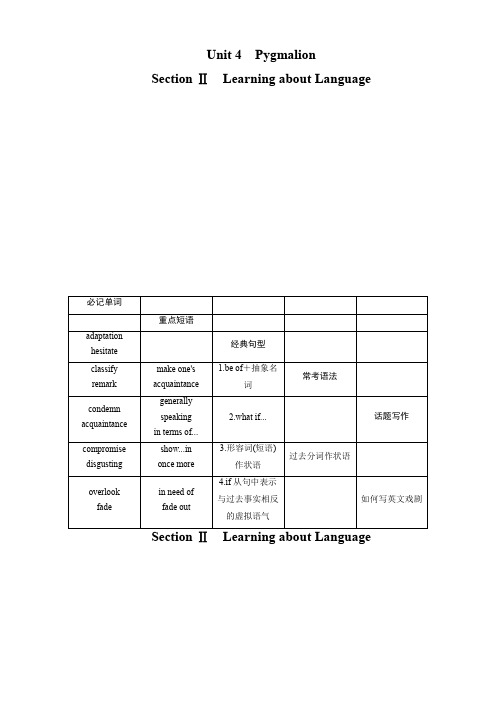
Unit 4Pygmalion Section ⅡLearning about LanguageⅠ.单词速记1.__antique__ (adj.) 古时的;珍贵的(n.) 古董;文物2.__musical__ (adj.) 音乐的→__music__ (n.) 音乐3.__Buddhism__ (n.) 佛教→__Buddhist__ (n.) 佛教徒4.__rob__ (v.) 抢劫→__robber__ (n.) 强盗→__robbery__ (n.) 抢劫,偷盗Ⅱ.短语互译__rob_sb.of_sth.__ 抢某人某物Ⅲ.语法感悟用所给动词的适当形式填空1.Now once ___taught__ (teach) by me, she'd become an upper class lady.2.Once __educated__ (educate) to speak properly, that girl could pass herself off in three months as a duchess.3.__Written__ (write) in a hurry, this article was not so good.4.__Accepted__ (accept) by the Party, he decided to devote his life to the cause of the Party.5.She walked out of the house, __followed__ (follow) by her little daughter.重点词汇rob vt.抢劫;盗窃;剥夺①The bank at the corner was robbed last night.昨天晚上街角的那家银行被抢了。
常用形式:rob sb.of sth.抢劫某人某物;剥夺某人某物②They knocked the driver down and robbed him of his car.他们把司机打倒在地,抢走了他的车。
【教学】高中英语Unit4Pygmalion阅读2教案新人教版选修8

【关键字】教学云南省陇川县第一中学高中英语《Unit 4 Pygmalion》阅读2教案新人教版选修8Teaching goals教学目标1. Target language 目标语言a. 重点词汇和短语pronounce, distinct, nail, compromise, horrible, bathtub, sob, disgusting, overlook, alphabet, fade, classic, effective, show...in, the other day, take away, in need of, fade outb. 重点句子I’m not asking any favours — and he treats me like dirt.I’d never have come if I’d known about this disgusting thing you want to do to me, I...What’s to become of me?2. Ability goals 能力目标Enable the students to talk about the play Making the bet.3. Learning ability goals 学能目标Help the students learn how to talk about the play Making the bet.Teaching important & difficult points 教学重难点How to talk about the play Making the bet.Teaching methods 教学方法Individual work and discussion.Teaching aids 教学准备A recorder and a projector.Teaching procedures & ways 教学过程与方式StepⅠRevisionCheck the homework.Ask the students to review Act One: Fateful meetings.A sample summary of the act:Eliza Doolittle, is a poor, dirty flower seller in the turn of the century England. The Pygmalion in this film is Henry Higgins (Harrison), a linguist and phonetic expert who believes that speech is what really sets the classes apart. He bets with his friend Colonel Pickering that through a change in dress and speech, he can turn the lower class Eliza into a lady that will fool high society. The only thing in the bet for Eliza is that she might be able to open her own flower shop and somewhat escape her lower class roots.Step Ⅱ ReadingHave the students read the play carefully and then answer the following questions.After a few minutes.T: Now answer my questions. First: Do you think Eliza is very ambitious?S1: Yes, I think so. Because she still likes to learn even if Higgins treats her rudely.T: Why did Pickering fancy himself?S2: Because he can pronounce twenty-four distinct vowel sounds.T: What habits did Eliza have?S3: She has never had a bath in her life; not over her whole body.T: What do you think Higgins would have to do to change Eliza into a lady? S4: In order to have Eliza make a big change, Higgins has to teach her the alphabet.T: How do you think Colonel Pickering?S5: I think Pickering is very kind and well-educated.T: Why does Eliza collect Henry’s slippers for him although she is not a servant? S6: Although Eliza is not a servant, from her deep heart, she looks down upon herself, and think she is in the lower class. But Henry is in the higher class. So I think she collects his slippers willingly.T: Why does she throw the shoes at him?S7: Because Henry looks down upon her, which deeply hurts her. She is very angry. T: Why does Henry think he wins the bet?S8: Because he thinks it is he who makes Eliza attractive in the party.T: Why does Eliza get upset when Henry does not congratulate her?S9: Because in Eliza’s opinion, it is she that tries her best to make other people attracted to her.T: Why does Henry get upset when he hears Eliza will marry Freddy?S10: In fact, he loves Eliza, I think.After that, the teacher can lead the students to have a discussion about the ending of the play. Show the following.1. Do you think Eliza should marry Henry?2. Do you think Eliza should marry Freddy?3. If Eliza loves Henry and marries him, do you think he will become a good husband?About ten minutes later, ask the students to present their answers.Sample answers:I think Eliza will marry neither Freddy nor Henry. After all Freddy does not know the past of Eliza. If one day Freddy learns about that, he will not accept all of this. He belongs to the upper class and maybe in his deep heart he looks down upon Eliza. As for Henry, I think he is very greedy and proud. He only treats Eliza as his bet. He only wants to prove he is capable, although at last he falls in love with Eliza. However, when he truly marries Eliza, the selfishness will again appear. He will not become a good husband. As a matter of fact, Eliza has become a confident girl after experiencing these things. Maybe she will find her true love at last.Step ⅢHomeworkT: In Act Two, Scene 1, Eliza went to Higgins’ house for help while Colonel Pickering was there. Higgins decided to begin his experiment. He first wanted her to take a bath and then discussed with Pickering about how to teach the girl. Today’s homework:1. Read the play once again.2. Pre-listen to the recording for Listening and speaking part.此文档是由网络收集并进行重新排版整理.word可编辑版本!。
- 1、下载文档前请自行甄别文档内容的完整性,平台不提供额外的编辑、内容补充、找答案等附加服务。
- 2、"仅部分预览"的文档,不可在线预览部分如存在完整性等问题,可反馈申请退款(可完整预览的文档不适用该条件!)。
- 3、如文档侵犯您的权益,请联系客服反馈,我们会尽快为您处理(人工客服工作时间:9:00-18:30)。
Unit 4 Pygmalion Period 2 Learning about Language & sing Language 同步精练(人教版选修8,重庆专用)时间:30分钟Ⅰ.短语填空2.They________the bank________millions of dollars.3.________ ________we won the lottery?4.The sound of the motorbike________ ________in the distance.5.How can you________ ________ ________ ________come home? Go away! 6.She lay in bed,awake,________ ________thought last night.7.If anybody comes,ask him to________ ________his book.8.It is a real wonder to________ ________ ________.9.That is the spirit we are called to show________ ________ .10.He always tries to________ ________problems in the abstract and never thinks of the practical details.答案 1.Generally speaking 2.robbed;of 3.What if 4.faded away 5.have the face to 6.deep in7.take away8.make your acquaintance9.once more10.deal withⅡ.完成句子1.二十年后,那可怕的经历逐渐从记忆中消失了。
(fade away)Memories of the terrible experience________ ________after twenty years.2.你干这么少工作还有脸多要钱?(have the face to)How can you ________ ________ ________ ________ ________ ________more money when you do so little work?3.如果我们将画移到那将会怎样?(what if)________ ________we move the picture over there?4.我们当时不知道你遇到了困难,要不然我们会帮助你的。
(otherwise) We didn't know you were in trouble at that time,________we ________________ ________you a hand.5.如果他听我的劝告的话,就不会犯这样的错误了。
(虚拟语气) If he________ ________my advice,he________ ________ ________ ________such a mistake.答案 1.faded away 2.have the face to ask for 3.What if4.otherwise;would have given 5.had taken;would not have made Ⅲ.单项填空1.I________sooner but I didn't know that they were waiting for me.A.had come B.was comingC.would come D.would have come解析考查与过去事实相反的虚拟语气。
句意:我本该早点儿来的,但我不知道当时他们正在等我。
根据后面一句话的意思可反推出说话人觉得自己当时应该早点到,但实际上过去并未这么做。
would have done sth表示“过去本来会做某事”,暗含的意思是过去并未做到。
答案 D2.His tastes and habits________with those of his wife.A.combine B.competeC.coincide D.compromise解析句意:他们夫妻习惯爱好都一样。
coincide意为“巧合”。
其他三个词和介词with搭配的意思分别为:combine with意为“与……结合/联合”;compromise with意为“跟……妥协”;compete with意为“与……竞争或进行比赛”。
答案 C3.American women were________the right to vote until 1920 after years of hard struggle.A.ignored B.deniedC.overlooked D.neglected解析deny sb sth拒绝给予。
答案 B4.The bank is reported in the local newspaper________in broad daylight yesterday.A.being robbedB.having been robbedC.to have been robbedD.robbed解析句意:据本地报纸报道,这家银行昨天光天化日之下被抢劫。
sth /sb is reported to do sth某物/人被报道做某事。
答案 C5.I wonder how anyone can________condemn others when he reflects upon his own thoughts.A.have the face to B.has the face toC.have a face to D.have face to解析句意:我真奇怪一个人在对自己的思想进行检讨后怎么还能有脸去谴责别人。
have the face to do sth毫不羞耻地做某事。
答案 A6.It was a________accident—I'll spare you the details.A.horrible B.horriblyC.possible D.possibly解析句意:这是一场可怕的事故。
我会告诉你细节的。
horrible可怕的,恐怖的。
答案 A7.The mother would rather the boy________what she demands of him—to set the frog________free.A.to do;caught aliveB.did;being caught livingC.did;caught aliveD.had done;caught lovely解析考查虚拟语气和形容词。
句意:这位母亲想让小男孩照她说的做:把那只被活捉的青蛙放了。
该句中的would rather后面要用一般过去时表示虚拟;而那只鸟是被活捉,所以要用caught alive。
答案 C8.There are too many difficulties for us________. We really don't know________to do.A.to deal with;what B.to deal with; howC.to do with; how D.to do with:what解析考查动词。
句意:有大多的困难让我们处理,我们真的不知道该做些什么。
处理困难要用deal with;而第二个空后面的do缺少宾语,应该用what。
答案 A9.The sound of the train________in the distance. Which of the following is WRONG?A.faded out B.faded away C.died away D.died out 解析句意:火车的声音渐渐消失在远方。
fade out,fade away,die away都可指声音渐渐消失。
die out“灭绝,灭亡,绝种”。
答案 D10.Many personnel managers say it is getting harder and harder to________honest applicants from the growing number of dishonest ones.A.distinguish B.disguiseC.dissolve D.discount解析句意:许多人事经理声称由于不诚实应征者人数上升,越来越难和诚实的应征者加以区分了。
distinguish辨别;disguise掩饰,假装,假扮;dissolve 溶解,消除;discount折扣。
答案 A11.Bob and I see each other________but not as often as we used to.A.once more B.once in a whileC.in the end D.more or less解析句意:鲍勃与我偶尔会见面,但不像以前那么经常了。
once in a while“间或,偶尔”符合句意。
once more再次;in the end最后;more or less 或多或少。
答案 B12.Many youth don't know what to________at university; they can't make up theirminds about the future.A.take away B.take upC.take over D.take after解析考查动词短语。
句意:许多年轻人不知道在大学里应该学习什么,他们对自己的未来拿不定主意。
take away带走,解除,消除;take up开始从事,占据;take over接收,接管;take after(面貌、言行等)像。
答案 B13.—Jack,you seem in high spirits.—________We won the match 4∶0.A.Guess what? B.So what?C.No wonder. D.No doubt.解析考查情景交际。
句意:——杰克,看起来精神不错呀。
——你猜猜怎么了?我们以四比零赢得了比赛。
Guess what?“猜猜怎么了?”So what“那又怎么样呢?”No wonder.“难怪;怪不得”;No doubt.“毫无疑问”。
